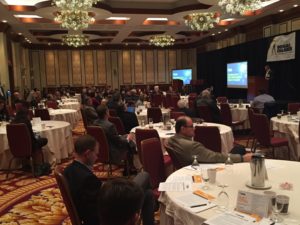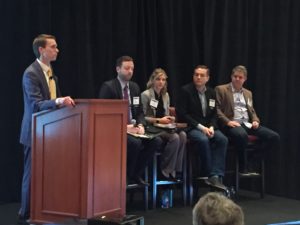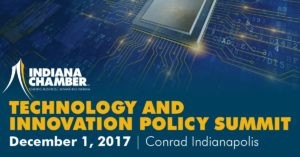
The discussions at the second Indiana Technology & Innovation Policy Summit last Friday were so plentiful and rich with content that three stages were utilized during the five-hour event. Seven sessions and a keynote address were part of the mix.
We’ll hit a few highlights below, but an overall takeaway: Our state has momentum, there is more work to do to continue that positive pace and one way for tech and innovation business leaders to get involved and help ensure success is communicating with your legislators. It’s a critical component.
In the words of the presenters:
- Fishers Mayor Scott Fadness: Indiana can largely check the box on enhancing its tax and business climate; today is about the innovation climate and building bridges between traditional industries and technology companies. And he says the IoT lab coming to Fishers will send a powerful message about aggregating talent.
- Software-as-a-Service: The legislative mission is to provide “certainty and predictability to the tech community” about SaaS and tax treatment. Three states (Washington, Tennessee and Pennsylvania) have put up red lights on software development by taxing SaaS. Indiana seeks to join a similar number with a green light encouraging investment. Christopher Day of DemandJump: “It’s not just about SaaS. What it’s about is growing our wealth as a state. It’s time to transition the Crossroads of America to the Nation’s Nucleus.”

- Certified Technology Parks: Fifteen of 23 tech parks in the state have met the $5 million funding cap. The proposal is to allow those parks that meet certification requirements to be eligible for additional funds to continue to provide technical assistance to companies within the facilities.
- Larry Gigerich, Ginovus, on expanding investment capital: Twenty states have tax credits that are transferable, sellable or bondable with eight or nine more set to consider such action. Indiana is missing from that equation, its 20% tax credit is no longer competitive against many other states and the state’s cap is “middle of the pack.” Although the Next Level Fund approved in 2017 will be helpful, Gigerich gives preference to a stronger tax credit system.
- Autonomous vehicles (AV): State Rep. Ed Soliday presented extensive data. Again, Indiana is looking to join other states (21 with legislation, five with executive orders) with some form of policy. Indiana’s goals: ensure public safety and encourage innovation/AV research and development in our state. Soliday says much work needs to be done to convince the public about the benefits.
- Data centers: Rich Carlton of Data Realty didn’t argue with the general assertion that data centers themselves don’t create large numbers of jobs, but cited the related development and job creation that has taken place in South Bend. Tax treatment is preventing Indiana from being a participant in the national data center boom. A $2 million data center building with an additional $23 million in equipment would be taxed at the first figure in many states, but at $25 million in Indiana. Carlton: “Do we want to have part of something or all of nothing?”
Jeff Brantley, Indiana Chamber vice president of political affairs, connected the dots on legislative victories resulting from both political and policy involvement from the business community.
Micah Vincent, director of the Indiana Office of Management and Budget, shared that we can expect to see the initial Next Level Fund investments in the first quarter of 2018. And he projected that the 2018 Indiana General Assembly may very well end up being the “workforce session.”
Check out the two-page summary of how the legislative positions of the Chamber’s Tech Policy Committee can impact the state’s economic future. Look for continued coverage of these important issues through various Chamber communications.

